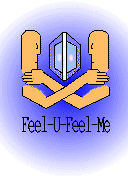



Copyright 2000 Stewart Dickson and Rebecka Dickson
Steve's mechanical engineering lab is in the bowels of
FermiLab.
It is a facility for manufacturing high-Gauss super conducting
electromagnets and liquid-Helium cryogenic equipment. All around
are lots of very high-tech machinery including combinations of
high-voltage wiring, high-vacuum plumbing and stainless-steel,
low-temperature insulating Dewar containers.
As one enters the lab there is a plasma sculpture, encased in glass.
It is done after the work of
Bill Parker and Guy Marsden.
In this piece, however, a model of the human nervous system has
been constructed in welded steel wire. Glowing tendrils of plasma
are snaking out from the nerve endings of the figure into space. This
piece illustrates
Roger Penrose' theory of quantum nerve behavior
and hypothetical connections to the cosmological quantum
continuum. It also visually simulates James Redfern's description of
human aura energy radiation.
There are nerve endings in our eyes sensitive to energy at the level
of a single quantum event -- a single photon. It has been
hypothesized that other neurons are sensitive to quantum events
such as the spontaneous generation of an electron-positron pair.
Events occur throughout the vacuum of the cosmos. Indeed, our very
consciousness might be dependent on this fabric of space-time for its
origins.
Further inside the lab, Larry is feeling one of Steve's first
mathematical models.
Larry says excitedly, "For years, I have had this mental picture of the
mathematics -- now it's like I've put my hands inside my head!"
"This is great! Look, here is how the parametric space runs..."
He demonstrates, running his hand along the sensuous curves of the
surface. "And my hand is doing the functional mapping!"
His wrist turns to follow the curve.
"This could be a real breakthrough to my work." Larry pauses to
reflect. "If only you could animate these."
Steve says, "Actually, it's not as far-fetched as it might seem.
I have ample resources in computer-aided micromechanical
manufacturing here, that I could produce a computer-interfaced
tactile screen."
Larry says, "But I already have my two-dimensional Braille screen."
"No, no," Steve says, "I think I could make one which could transmit
high-relief. Let me work on it, and I'll see how deep I can get."
